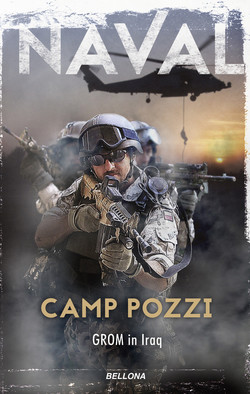Читать книгу Camp Pozzi. GROM in Iraq - Naval - Страница 8
На сайте Литреса книга снята с продажи.
1. Bill Pozzi
Оглавление“Anybody home?” the rough voice of a somewhat older gentleman came from the doorstep of our bungalow. The voice woke us at high noon on our first day among the date palms, somewhere on the outskirts of Baghdad, in a settlement by one of Saddam’s palaces.
“Hi guys” — the melodic greeting that followed was a touch warmer.
Our English, when employed as a joint effort, was already good enough to welcome our guest and find out what he wanted from us — or rather, as it turned out, what we might want from him in our Iraqi reality.
“Pozzi, Bill Pozzi, I’m the Chief around here,” the gentleman, clad in American uniform pants and a brown T-shirt, introduced himself. “If you guys need anything, bring me a list, and I’ll take care of it or do some shopping at the PX.[1]”
Saddam Hussein’s Palace in Baghdad
This is how Bill Pozzi greeted us. He must have been quite brawny once. In spite of his age, he hadn’t lost anything of his military bearing, and a slight belly only added to his stature. As a welcome gift, he brought us a box of batteries. “In this climate, they run out in no time, and you usually operate at night, so you all need to have a lot of these,” he explained, placing it on the table.
Entrance gate to Camp Jenny Pozzi with an inscription and the green mascot of the SEALs
Such are my memories of our first encounter with Bill Pozzi. Our guest turned out to be one of the oldest, if not the oldest Navy SEAL in the history of this legendary US Navy unit — and a living legend by the time we met him. His experience and dedication were impressive, and his age was an extra advantage — you could say that Pozzi knew literally everything there was to know about life in military bases. He asked us about simple things — needs so basic that they’re often overlooked, though they’re a part of every soldier’s daily life. Bill Pozzi joined the US Navy as a volunteer in a time when most young men avoided military service like the plague. Some of his friends would break their joints with pool cues and feign old football injuries, fearing a “fit for duty” opinion of the military medical board, which meant an unwanted conscription. It’s hardly surprising — the late 1960s were the period of military operations in the Indo-Chinese Peninsula (the Vietnam War), and, after all, not every young man has a warrior’s soul.
Pozzi first joined the US Navy reserve. He was absolutely convinced it was safer than serving in the infantry. He served as a submarine sailor for a time — and he didn’t like it. His vessel was so old it must have been operational during the Second World War. Pozzi worked as a mechanic. He often went to bed with his hair so greasy his head slipped off the pillow as he slept. And then he heard of the Navy SEALs, and he found his place among their ranks for many years (thirty to be exact). Initially, as he recalls, the Navy SEALs somehow reminded him of the Sea Hunt television series — it was all about beaches, girls, and beer, which seemed a good enough list of reasons to enlist. This is how, on our very first day of the war, we got to know a SEAL, whose service had started in the jungles of Vietnam. Who among us hasn’t seen Rambo?
It wasn’t a very long way home for us…
In Vietnam, the SEALs, including Pozzi, secured beaches ahead of Marine landings. It was a time of countless combat missions and patrols, and it was there that he first encountered an enemy face-to-face. Later in his career, he secured the landing of Apollo 12. He volunteered for the task, which definitely wasn’t easy — after the mission, he was just as exhausted as the astronauts returning from the Moon. This is how he became the first SEAL to meet the Apollo crew; his name appeared on TV. When Pozzi, at 54, wanted to enlist for the first Gulf War in 1990, the Medical Board rejected him as being “too old, too fat, and too dumb.” Being a keen expert, he ended up going to Iraq regardless, and later, in 2003, he greeted us in Baghdad. At that point, nobody reproached him because of his age, or his belly for that matter. Pozzi was the mastermind behind our base setup. He built the entire infrastructure from scratch, took care of our supplies — and, most importantly, he knew everything about our vehicles. He was also a generous man, raising money among the soldiers for a Catholic orphanage in Baghdad. Yet he remained a warrior until the very last days of his service, occasionally taking part in combat operations. The guy just loved to fight throughout his whole military career. No wonder our base was known as Camp Pozzi. Camp Jenny Pozzi, to be precise. Pozzi’s daughter was in the military too. He decided that instead of having the base named after him, he would rather honor her as a soldier. Thus, we called it Camp Jenny Pozzi.
1 PX, Post Exchange, base exchange — a type of retail store found on United States military installations worldwide. Originally akin to trading posts, they now resemble contemporary department stores or strip malls.
